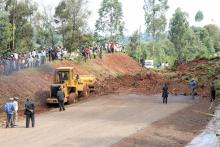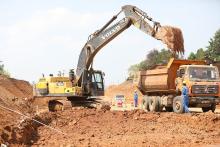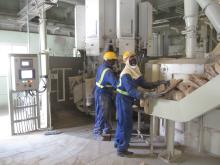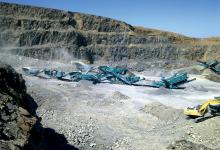ARM Cement Plc (ARM Cement), once Kenya’s second biggest-cement maker after Lafarge’s Bamburi Cement, has sold off some of its Kenyan assets for US$50 million, as the company seeks to improve its liquidity and reduce a crippling debt that saw it being placed under administration in the third quarter of 2018.
The cement manufacturer, which operates a clinker and cement-grinding plant in Kaloleni and Athi River in Kenya, announced through the joint administrators in May the approval of “a robust, competitive and transparent transaction process aimed at identifying strategic or financial investors.”
According to joint administrator George Weru, the search for strategic or financial investors was to enable the company to achieve “recapitalisation through an injection of equity and/or a sale of all or some of the assets of the company and/or a comprehensive restructure of its debt obligations.”
When it was placed under administration in August 2018, the cement company, which operates limestone, clinker and cement plant in Tanzania under the trading names ARM Tanzania and Maweni Limestone, was grappling with a debt of more than $190 million. The firm had reported slower trading across its East Africa cement market operations on the back of a violent election cycle in Kenya, policy changes in Tanzania, and an oversupply of cement in the region.
Although Dangote Cement, part of the Nigerian conglomerate Dangote Group, had expressed interest in acquiring 100% of the ARM Cement assets, and Oman’s Raysut had indicated it was keen on snapping up 70% of the company’s assets, it was National Cement Company Ltd, a subsidiary of Devki Group, that pulled off a surprise deal that saw it acquire some of the assets on sale, according to Weru’s statement last May.
National Cement, known for its market brand Simba, currently holds nearly 20% of the East African market. With its acquisition of ARM Cement assets in Kenya, it has become the second-biggest cement maker in the country, after Bamburi Cement.
Weru said the joint administrators entered into an agreement for the acquisition of all cement and non-cement assets and all the business of ARM Cement Plc in Kenya as a going concern with National Cement Company Limited for $50 million, subject to approvals by requisite regulatory bodies.
“Once the transaction is completed and the sale proceeds paid to the administrators, the proceeds from the sale shall then be used to settle registered claims against the company and distributed to the creditors, in accordance with the provisions of the Insolvency Act 2015 of Kenya,” he said.
ARM Cement, which has an estimated production capacity of 100,000 tonnes per year in Rwanda, where it trades as Kigali Cement, is known in the regional market as the manufacturer of the Rhino cement brand.
The sale of the company’s assets is a culmination of a series of market dynamics and trends that hit not only ARM Cement but also its competitors within the East Africa region, as economic out-turns and political upheavals jolted medium- and long-term infrastructure development and eroded appetite for consumption growth. Other players in East Africa’s cement market include East Africa Portland Cement, Dangote Cement Plc and Mombasa Cement Ltd.
In its assessment of its 2017 performance, ARM Cement noted there was suppressed demand for cement in Kenya “notably due to the impact of the prolonged electioneering period as well as increased challenges in Tanzania.”
According to Kenya Association of Manufacturers, 2017 was a difficult year for the industry in Kenya on the back of “a severe drought, and unusually high inflation rates mid-year”.
“We also had to try and stay afloat, for the most part, as it was an election year, and business had substantially slowed down. All of these things combined adversely affected our economy,” said Phyllis Wakiaga, the association’s chief executive.
For ARM Cement, the situation was compounded by the long-term effects of the mid-2016 policy change in Tanzania banning importation of coal for powering cement manufacture operations. The company has an installed capacity of 1,600,000 tonnes a year in Tanzania.
“Since the ban came in when there was only one large coal mine - Ngaka mine, managed by Tancoal Energy - there was insufficient supply of coal in the country, which impacted clinker and cement production in the second half of 2016, as well as the first half of 2017,” said brokerage firm Apex Africa Capital Ltd in its ARM Cement earnings update for the first half of 2017.
“The dip in coal supply coupled with depressed cement prices in the country ate into the already low profit margins for ARM, leading to a negative earnings before interest, taxes, depreciation, and amortisation (EBITDA) in Tanzania,” said Apex Africa Capital.
According to the brokerage house, “the insufficient supply of coal in Tanzania affected Kenyan operations as the Kenyan unit imports some clinker from Tanzania to meet its demand for cement production and as such, the volumes sold in Kenya declined.”
Moreover, ARM Cement said the coal importation ban in Tanzania “not only increased manufacturing costs but also impacted on optimal capacity of utilisation of the clinker plant at Tanga, due to chronic undersupply of coal.” The inability to generate adequate revenues by the 2014-built clinker plant saw ARM Cement’s market value slide 10%.
Furthermore, ARM Cement and its competitors in the East African cement market have been grappling with the increased production capacity, which has eroded prices of the construction material across the region.
By 2017, ARM Cement noted the “excess capacity in the market resulted in price pressures, with every manufacturer embarking on price strategy to maintain volumes.”
Bamburi Cement, the biggest cement maker in the region, said later in 2018 there was a market decline of 5% in Kenya, East Africa’s largest cement consumer, while Uganda experienced “flat” growth.
“Increased competitive pressure fuelled by a growing gap between installed cement, grinding capacity and a shrinking market, has played a key role in (cement) market dynamics,” said a statement by Bamburi Cement Board of Directors, chaired by Dr John Simba.
Additionally, says global market researcher, Research and Markets, “imports from Asian countries resulted in an oversupply of cement within the region (East Africa) which further restrained the market growth.”
A further constraint, according to Bamburi Cement, has been high operating costs, driven by expensive energy, imported clinker and raw material input prices, which continue to impact the cement market, particularly in Kenya and Uganda.
Moreover, Research and Markets adds cement market growth in East Africa has been on the decline since 2015 “due to increased power tariffs, currency devaluations and high interest rates which led to a slowdown in the region’s construction activities.”
With the restructuring of ARM Cement debt now on course, the company is expected to rejuvenate its cement production capacities and pile much more competitive pressure on the region’s market.
The firm says it “intends to reduce further current debt levels and has initiated a process to restructure the balance sheet with a view to reducing the short-term nature of the debts.”
The anticipated improvement of ARM Cement’s liquidity is likely to coincide with a rebound of the East Africa cement market, with Research and Markets saying the region’s production volumes could rise to 22.2 million tonnes by 2023, up from the 14.4 million tonnes of 2017.
According to Research & Markets’ December 2018 overview of the region’s cement market, demand growth will be boosted by investments made by the regional governments in public infrastructure, such as development of Entebbe International Airport, the redesigning of Malaba-Kampala railway route into a standard gauge line, the upcoming construction of Bukasa port in Uganda, and the development of roads, rail and water transport facilities in Rwanda.









